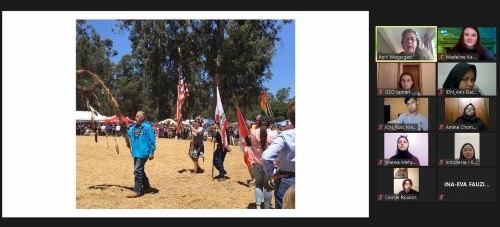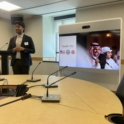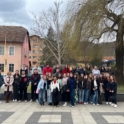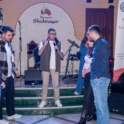Abdulaziz reflects on the highlights from serving as a mentor for CEW.
STORIES
Virtual Exchange Students Learn Native American History
In November, YES virtual exchange participants placed with AFS engaged in several exciting activities focused on Native American history, culture and language preservation.
As part of a discussion on how knowledge of historical events can affect one’s understanding of current events, participants heard from special guest Evelyn Lance Blanchard, a Laguna Pueblo Elder, and learned about the first encounter of Native Americans with 16th-century Spanish explorers. Pueblo villagers are New Mexico's original Native inhabitants. The activity was facilitated by Thamara Thiedeman and Kathie Hiebert-Dodd, local volunteers in the AFS New Mexico chapter, who were eager to share the history of their community.
Participants were asked to share an aspect of their country’s history to help their peers and American host families better understand their current events.
Bennedicta from Indonesia shared, “History is always interesting to me, but after our activities, I realized that history is about understanding…history is never black or white, but maybe shades of grey...It’s to understand what went wrong so that we can make sure it will never happen again.”
Salma from Egypt writes, “Thank you so much for today's activity; I learned things about American history that I had absolutely no idea about.”
Virtual exchange participants were also treated to a concert by Native American flute player Bonnie Schmader and learned about the flute’s importance to indigenous cultures of the American Southwest.
In another session, students explored some of the approximately 150 Native American languages in the U.S., and the efforts to preserve them for future generations. Nabiha from Bangladesh wrote, “Before I joined this session, I had no idea that my country had endangered languages. In total, 5 languages are endangered in Bangladesh and all of them are spoken by the indigenous people. I also learned that there's one endangered language in Macedonia from my Macedonian exchange friend Stojan.”

After viewing a video of a Wacipi PowWow, Anis from Indonesia, shared, "I learned the values behind the Wacipi PowWow and I'm quite impressed. A Wacipi PowWow is a Native American gathering focused on dance, song and family celebration. PowWows celebrate the connection to tradition and spirituality. I noticed the similarity with traditional costumes of tribes in Papua, called Koteka or Holim.”
"Traditional activities bring us together, we can actually see how big of a family we are on those festivals, holding onto tradition and passing it on."





